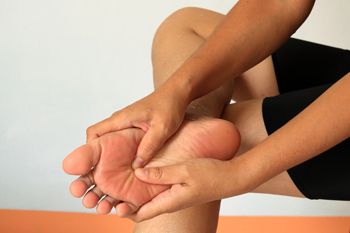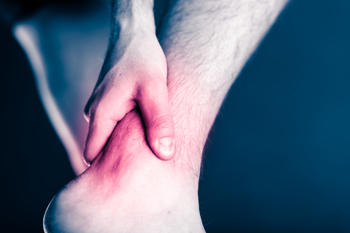Issaquah Podiatry Blog | Foot and Ankle Treatment Tips | Issaquah Foot & Ankle Specialists
 Sever’s disease is a common issue that leads to heel pain in children between the ages of 8 and 14. Sever’s disease occurs when the bones in the calves grow faster than the Achilles tendon, which connects the heel bone to the calf muscle. This causes the tendon to tighten and the heel to become swollen and sore. Sever’s disease symptoms are typically most prominent during running or jumping activities. However, there is usually no long term damage caused by Sever’s disease as the child continues to grow. Common symptoms include limping, tenderness in the heel, especially after exercise, and swelling in the heel bone. If you believe that your child is struggling with Sever’s disease, consulting with a podiatrist is suggested.
Sever’s disease is a common issue that leads to heel pain in children between the ages of 8 and 14. Sever’s disease occurs when the bones in the calves grow faster than the Achilles tendon, which connects the heel bone to the calf muscle. This causes the tendon to tighten and the heel to become swollen and sore. Sever’s disease symptoms are typically most prominent during running or jumping activities. However, there is usually no long term damage caused by Sever’s disease as the child continues to grow. Common symptoms include limping, tenderness in the heel, especially after exercise, and swelling in the heel bone. If you believe that your child is struggling with Sever’s disease, consulting with a podiatrist is suggested.
Sever's disease often occurs in children and teens. If your child is experiencing foot or ankle pain, see the podiatrists from Issaquah Foot & Ankle Specialists. Our doctors can treat your child’s foot and ankle needs.
Sever’s Disease
Sever’s disease is also known as calcaneal apophysitis, which is a medical condition that causes heel pain I none or both feet. The disease is known to affect children between the ages of 8 and 14.
Sever’s disease occurs when part of the child’s heel known as the growth plate (calcaneal epiphysis) is attached to the Achilles tendon. This area can suffer injury when the muscles and tendons of the growing foot do not keep pace with bone growth. Therefore, the constant pain which one experiences at the back of the heel will make the child unable to put any weight on the heel. The child is then forced to walk on their toes.
Symptoms
Acute pain – Pain associated with Sever’s disease is usually felt in the heel when the child engages in physical activity such as walking, jumping and or running.
Highly active – Children who are very active are among the most susceptible in experiencing Sever’s disease, because of the stress and tension placed on their feet.
If you have any questions, please feel free to contact one of our offices located in Issaquah, WA . We offer the newest diagnostic and treatment technologies for all your foot and ankle injuries.
 Neuropathy occurs when nerves that are in the feet or hands become damaged. Common symptoms of neuropathy include a sense of numbness or tingling, burning or stabbing pain, a loss of balance, and muscle weakness in the feet. Those who are older, have a family history of neuropathy, are malnourished, or have preexisting conditions like diabetes or cancer, are at a higher risk for developing neuropathy. Treatment options for this condition may include a nutritional plan, pain medications, or physical therapy. If you believe that you are afflicted with neuropathy it is important to consult with a podiatrist for proper treatment.
Neuropathy occurs when nerves that are in the feet or hands become damaged. Common symptoms of neuropathy include a sense of numbness or tingling, burning or stabbing pain, a loss of balance, and muscle weakness in the feet. Those who are older, have a family history of neuropathy, are malnourished, or have preexisting conditions like diabetes or cancer, are at a higher risk for developing neuropathy. Treatment options for this condition may include a nutritional plan, pain medications, or physical therapy. If you believe that you are afflicted with neuropathy it is important to consult with a podiatrist for proper treatment.
Neuropathy
Neuropathy can be a potentially serious condition, especially if it is left undiagnosed. If you have any concerns that you may be experiencing nerve loss in your feet, consult with the podiatrists from Issaquah Foot & Ankle Specialists. Our doctors will assess your condition and provide you with quality foot and ankle treatment for neuropathy.
What Is Neuropathy?
Neuropathy is a condition that leads to damage to the nerves in the body. Peripheral neuropathy, or neuropathy that affects your peripheral nervous system, usually occurs in the feet. Neuropathy can be triggered by a number of different causes. Such causes include diabetes, infections, cancers, disorders, and toxic substances.
Symptoms of Neuropathy Include:
- Numbness
- Sensation loss
- Prickling and tingling sensations
- Throbbing, freezing, burning pains
- Muscle weakness
Those with diabetes are at serious risk due to being unable to feel an ulcer on their feet. Diabetics usually also suffer from poor blood circulation. This can lead to the wound not healing, infections occurring, and the limb may have to be amputated.
Treatment
To treat neuropathy in the foot, podiatrists will first diagnose the cause of the neuropathy. Figuring out the underlying cause of the neuropathy will allow the podiatrist to prescribe the best treatment, whether it be caused by diabetes, toxic substance exposure, infection, etc. If the nerve has not died, then it’s possible that sensation may be able to return to the foot.
Pain medication may be issued for pain. Electrical nerve stimulation can be used to stimulate nerves. If the neuropathy is caused from pressure on the nerves, then surgery may be necessary.
If you have any questions, please feel free to contact one of our offices located in Issaquah, WA . We offer the newest diagnostic and treatment technologies for all your foot care needs.
 The Achilles tendon is located in the calf behind the heel, and is a band of tissue that connects the two together. While considered to be the strongest tendon in the body, it can still be prone to serious injury. Severe pain and discomfort often accompanies an Achilles tendon injury, and can cause difficulty in completing daily activities. The injury can happen as a result of suddenly stepping off of a curb, or from frequently wearing high heels. Common symptoms that many patients experience with an Achilles tendon tear or rupture can include extreme tenderness, soreness, and difficulty walking. Relief may be found when the affected foot is rested, and it may help to wear a protective boot as the healing process occurs. Additionally, simple stretches can be performed which may help to strengthen the tendon. If you have endured an injury that affects the Achilles tendon, it is strongly suggested that you consult with a podiatrist who can determine what the best course of treatment is for you.
The Achilles tendon is located in the calf behind the heel, and is a band of tissue that connects the two together. While considered to be the strongest tendon in the body, it can still be prone to serious injury. Severe pain and discomfort often accompanies an Achilles tendon injury, and can cause difficulty in completing daily activities. The injury can happen as a result of suddenly stepping off of a curb, or from frequently wearing high heels. Common symptoms that many patients experience with an Achilles tendon tear or rupture can include extreme tenderness, soreness, and difficulty walking. Relief may be found when the affected foot is rested, and it may help to wear a protective boot as the healing process occurs. Additionally, simple stretches can be performed which may help to strengthen the tendon. If you have endured an injury that affects the Achilles tendon, it is strongly suggested that you consult with a podiatrist who can determine what the best course of treatment is for you.
Achilles tendon injuries need immediate attention to avoid future complications. If you have any concerns, contact the podiatrists of Issaquah Foot & Ankle Specialists. Our doctors can provide the care you need to keep you pain-free and on your feet.
What Is the Achilles Tendon?
The Achilles tendon is a tendon that connects the lower leg muscles and calf to the heel of the foot. It is the strongest tendon in the human body and is essential for making movement possible. Because this tendon is such an integral part of the body, any injuries to it can create immense difficulties and should immediately be presented to a doctor.
What Are the Symptoms of an Achilles Tendon Injury?
There are various types of injuries that can affect the Achilles tendon. The two most common injuries are Achilles tendinitis and ruptures of the tendon.
Achilles Tendinitis Symptoms
- Inflammation
- Dull to severe pain
- Increased blood flow to the tendon
- Thickening of the tendon
Rupture Symptoms
- Extreme pain and swelling in the foot
- Total immobility
Treatment and Prevention
Achilles tendon injuries are diagnosed by a thorough physical evaluation, which can include an MRI. Treatment involves rest, physical therapy, and in some cases, surgery. However, various preventative measures can be taken to avoid these injuries, such as:
- Thorough stretching of the tendon before and after exercise
- Strengthening exercises like calf raises, squats, leg curls, leg extensions, leg raises, lunges, and leg presses
If you have any questions please feel free to contact one of our offices located in Issaquah, WA . We offer the newest diagnostic tools and technology to treat your foot and ankle needs.








